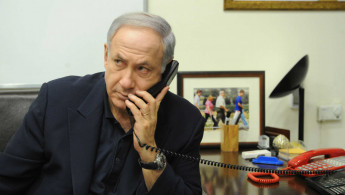Netanyahu calls Zuckerberg to complain about Facebook's treatment of Likud
The prime minister reportedly asked Zuckerberg to ensure that all parties will receive equal treatment in the run up to Israel's March election - the country's third election in a year.
Netanyahu's Facebook chat bot was suspended twice during Israel's September election. In one instance, a message telling voters that "Arabs want to annihilate us all" was found to breach hate speech policies.
Sources briefed on the conversation, which Netanyahu initiated, said Zuckerberg didn't comment on specific issues but promised to be alert to the issue, Haaretz reported.
"We are constantly talking with leaders worldwide," a company spokesperson said in comments quoted by the Israeli newspaper.
"Mark stressed in this conversation that Facebook is a platform open to all ideas."
The phone call also touched on technology issues, sources said. Zuckerberg reportedly promised to invest more in Facebook's Tel Aviv office.
The chatbot was suspended for publishing opinion poll results - a breach of Israeli election law. Israeli election law does not allow the release of opinion polls three days prior to elections.
Facebook had also suspended the chatbot a week prior to September's election day after it was found to violate hate speech policies.
|
The chatbot, part of the online election campaign for Netanyahu's Likud Party, greeted viewers with an automated message in Hebrew telling voters that "Arabs want to annihilate us all - women, children and men".
The message implored voters not to support the formation of a left-wing government that it said would include Palestinian-Israeli lawmakers.
It also boasted that Netanyahu would bring a "right-wing policy of a Jewish state, security, and a strong Israel".
Facebook said the chatbot had violated its "hate speech policy" and suspended it for 24 hours.
The head of the Palestinian Joint List party, Ayman Odeh, welcomed the September move.
"We went directly to Facebook and demanded that they stop giving a platform to Netanyahu's dangerous incitement and today we are seeing the results. We won against the camera project and we won the incitement too. There is an effect," he said, according to The Times of Israel.
The Likud Party tried to distance Netanyahu from the content of the chatbot, calling it a "mistake by a campaign worker" which had not been approved by the prime minister.
Anti-Palestinian and hardline nationalist rhetoric has long dominated Israeli election campaigns in a bid to influence voters.
Prior to the September election, Netanyahu issued a deeply controversial pledge to annex the Jordan Valley in the occupied West Bank if re-elected in 17 September polls.
He also attempted to introduce controversial legislation to allow party representatives to bring cameras to polling stations in a bid to intimidate Palestinian voters, but the bill was voted down.
Netanyahu famously warned on election day in 2015 that Palestinian-Israelis were "heading to the polling stations in droves", in an attempt to energise his right-wing base.
Netanyahu along with his right-wing and religious allies won a majority of seats in April polls, but failed to form a coalition and opted for an unprecedented second election.
Read more: App meltdown: Netanyahu's Likud party leaks data of over 6 million Israeli voters
September's election produced a similar deadlock and Israel is now gearing up for its third election in a year in March.
He is again facing a difficult challenge from ex-military chief Benny Gantz and his centrist Blue and White alliance.
Right-wing nationalist votes will be key to Netanyahu's efforts to continue his reign as Israel's longest-serving prime minister.
Follow us on Facebook, Twitter and Instagram to stay connected





 Follow the Middle East's top stories in English at The New Arab on Google News
Follow the Middle East's top stories in English at The New Arab on Google News


